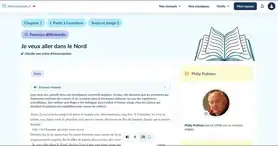Unit 1
Activity 3
Brain Drain or brain gain?
Ressource affichée de l'autre côté.
Faites défiler pour voir la suite.
Faites défiler pour voir la suite.
Text documentThe Brain Drain: Old myths, new realities
The Brain Drain: Old myths, new realities
The United States is the main pole of attraction
for foreign skilled workers; 40% of its
foreign-born adult population have tertiary level
education. Since the early 1990s, some 900 000
highly skilled professionals, mainly IT workers,
from India, China, Russia and a few OECD1 countries
(including Canada, the UK and Germany)
have migrated to the United States under the H1B2
temporary visa programme. […]
International mobility of skilled workers can
generate global benefits by improving knowledge
flows […]. The contribution of foreign skilled
workers to economic growth and achievement in
host countries, in particular to research, innovation
and entrepreneurship, is increasingly recognised
– witness the number of foreign-born US
Nobel Prize winners or creators of global high tech companies, such as Intel or eBay, and other successful
start-ups. […]
The harsh reality is that only a handful of countries
have been successful in luring their talented
emigrés back home […]; in 2000, it was estimated
that some 1,500 highly qualified Indians returned
from the United States, although more than 30
times that number depart each year. The risk of
a Brain Drain is real. Yet countries can create
opportunities for research, innovation and entrepreneurship
at home and stimulate a return flow
of migrants and capital, as well as win access to
international innovation networks.
2. A visa granted to foreign skilled workers for specialty occupations.
Ressource affichée de l'autre côté.
Faites défiler pour voir la suite.
Faites défiler pour voir la suite.
Questions
Differentiation
Read the text.
Then, click on your path! or
Path A
1-A
Where do skilled workers
come from?2-A
Do all talented
immigrants go back
home?
3-A
Identify solutions to stop
the Brain Drain.Useful vocabulary
Actually / In reality…
The solutions given are...
The solutions given are...
Path B
1-B
Summarize the current
tendency for skilled workers.2-B
Who does it benefit?3-B
What are the risks of the
Brain Drain? Can the situation
change?Useful vocabulary
Skilled
workers tend to…
There is a sharp contrast between…
There is a sharp contrast between…
Let's talk this out!
Group work
Mediation
4
Have you ever considered emigrating to the US? Why or why not?
Useful vocabulary
If I were... If I had... I would probably...
I have already / never considered emigrating to the US because…
I feel like immigrating to the US...
I seriously consider going to the US because...
I have already / never considered emigrating to the US because…
I feel like immigrating to the US...
I seriously consider going to the US because...
Ressource affichée de l'autre côté.
Faites défiler pour voir la suite.
Faites défiler pour voir la suite.
Les mots composés
-
a. Observez les
expressions soulignées
dans le texte. De quoi
sont-elles formées ?
(Nom ? Adj ?…)
Traduisez-les en
français.
b. Que remarquez-vous ?
c. Quelles sont les différences entre l'anglais et le français ?
Ressource affichée de l'autre côté.
Faites défiler pour voir la suite.
Faites défiler pour voir la suite.
Chain speaking
In groups of four, make sentences about the Brain Drain.Ressource affichée de l'autre côté.
Faites défiler pour voir la suite.
Faites défiler pour voir la suite.
Over to you!
Ressource affichée de l'autre côté.
Faites défiler pour voir la suite.
Faites défiler pour voir la suite.
Une erreur sur la page ? Une idée à proposer ?
Nos manuels sont collaboratifs, n'hésitez pas à nous en faire part.
j'ai une idée !
Oups, une coquille

